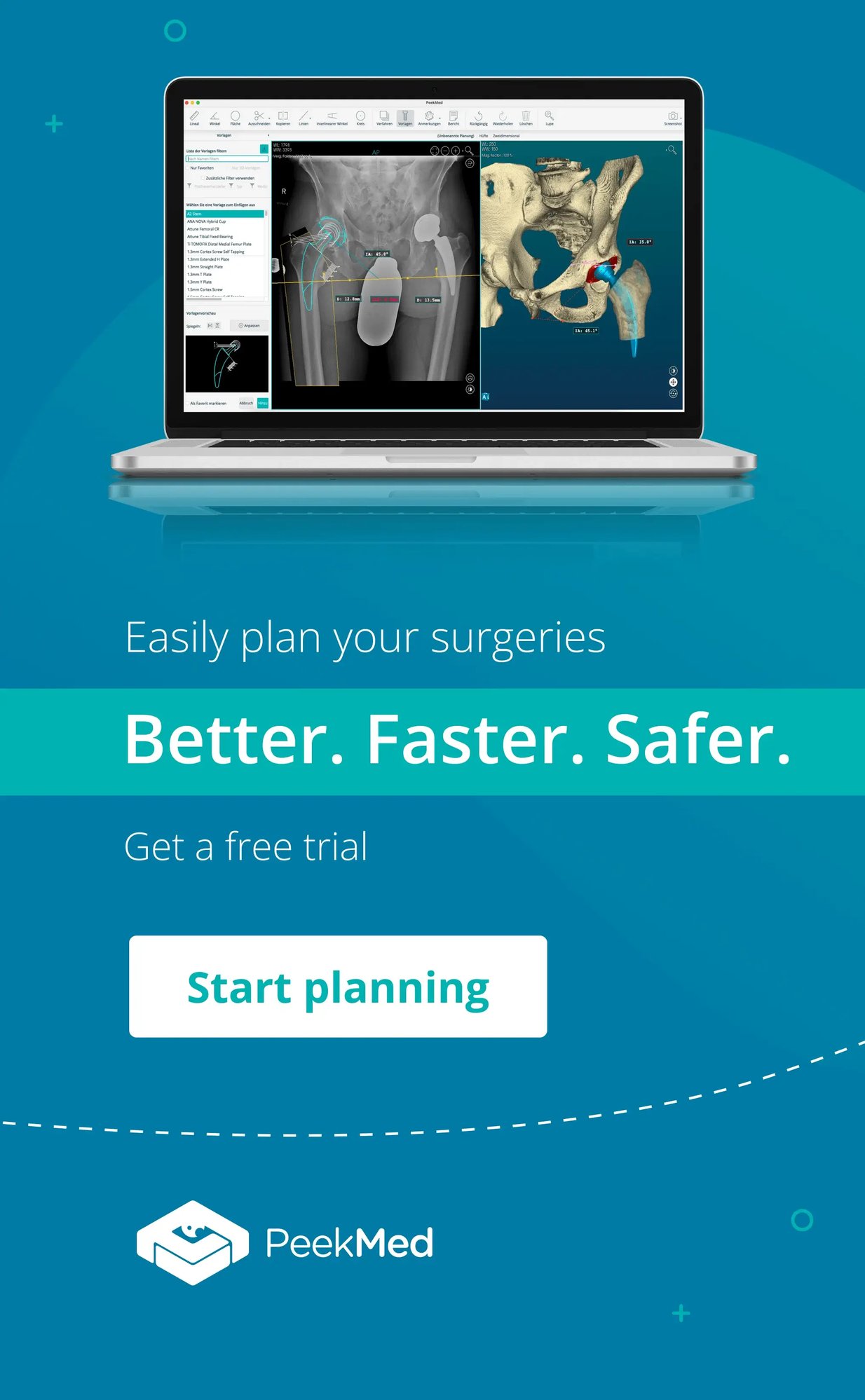PeekMed
The future of orthopedics is today. The orthopedics experts are here.
Technological trends like artificial intelligence and digital templating are revolutionizing the outcomes of surgical procedures for both doctors and patients.
To help you prepare for the future of orthopedics, we’ve asked experts what their thoughts are on trends expected to boost in the field.
In this article, you will find the opinions of orthopedic experts such as:
- Dr. Michael Meneghini (USA)
- Dr. Miroslav Stur (GER)
- Dr. Philipp Ahrens (GER)
- Dr. Levi Fernandes (PT)
- Todd Davis (USA)
Dr. Michael Meneghini: “The Orthopedic field needs efficiency”
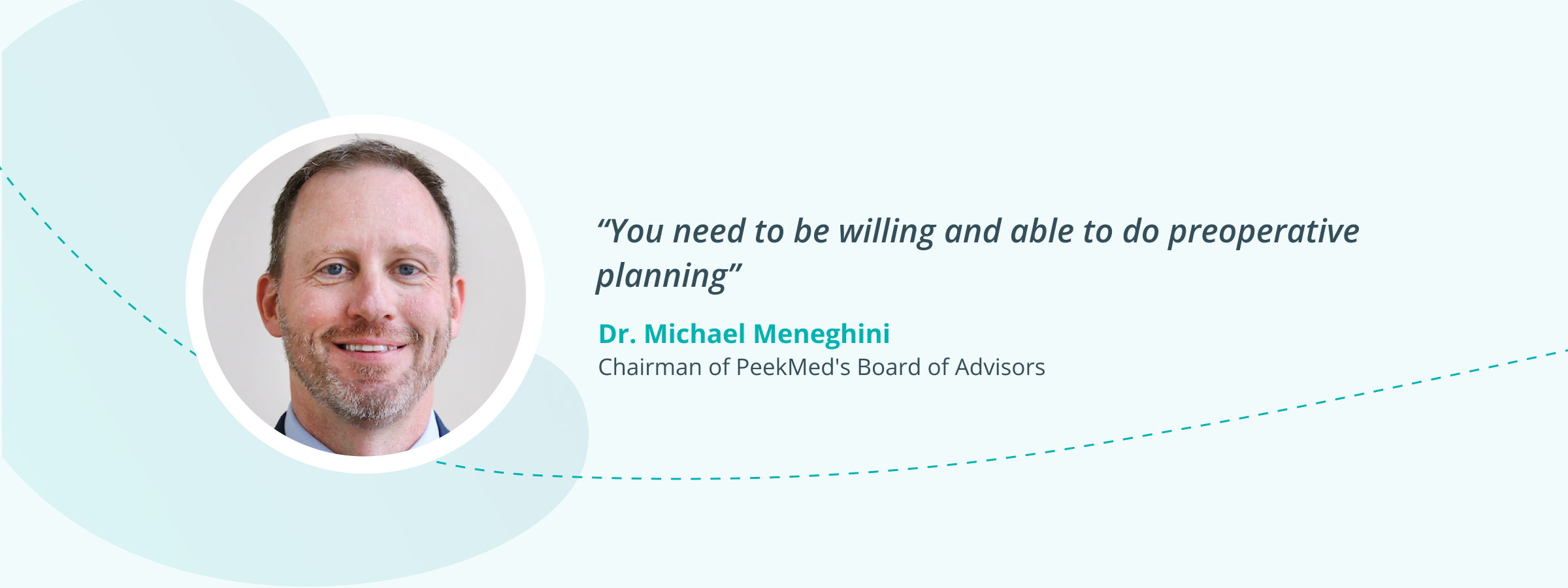
Efficiency. This is the word highlighted by Dr. Michael Meneghini. “Soon, efficiency has to be an orthopedic market trend”, explains the surgeon with extensive experience in the United States.
“Efficiency is paramount in ambulatory surgery. Setting space is at a premium and you typically can’t quickly turnover instruments throughout the surgery.”, adds the surgeon with extended experience in total joint replacement, partial knee replacement, and outpatient joint replacement surgery.
“Once you have determined which of your patients are appropriate candidates you need to be willing and able to do preoperative planning.”, Dr. Mineghini explains.
“Through preoperative planning and templates, you can work with your sales representative to pair down the instruments needed for each surgery and reduce implant inventory as well.”
“All these steps will serve to facilitate speedier, safer, and more efficient surgery for your patient.”, adds the surgeon who is also Chairman of PeekMed's board of advisors.
Dr. Meneghini also highlights that engagement is to be a global orthopedic trend. “An additional element to consider is the need for improved patient engagement before and after the surgical procedure.”
“Having steady communication with your patients will ensure that they are ready for surgery, thereby minimizing cancellations, which has a great cost.”, he adds.
“You also enhance the postoperative recovery process for your patients, thereby minimizing the potential for a return to the hospital.”, the doctor finishes.
Dr. Miroslav Stur: “We need to get back to communicate”.
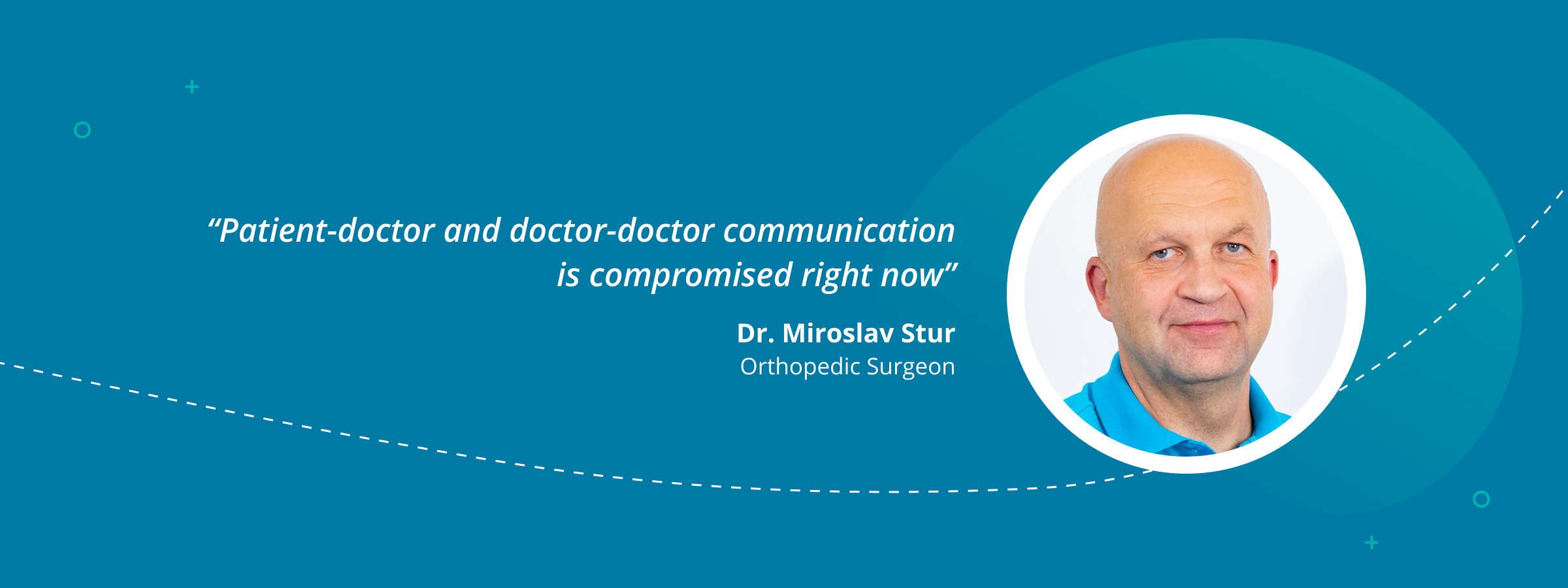
Dr. Miroslav Stur, specialist in trauma surgery, hopes for “normal” to be in the future of orthopedics. “I wish that both my medical colleagues and patients can return to normality after a strenuous two years”.
While not losing focus on the future trends in orthopedics, as Dr. Stur points out, it is important to think about the past.
Especially as millions of people saw their elective surgical procedures canceled worldwide during the first wave of the pandemic.
This is mainly because staff and resources were redistributed to provide care for patients with COVID-19. As such, we are not yet at activity standards.
While surgical activity has had a major drop – which is a major public health problem too –, Dr. Stur is also worried about communication:
“Both patient-doctor and doctor-doctor communication is compromised right now. We are limited by communicating with a mask and by being afraid to infect or be infected.”, all of this has an impact on patient outcomes.
Dr. Philipp Ahrens: moving for outpatient surgery
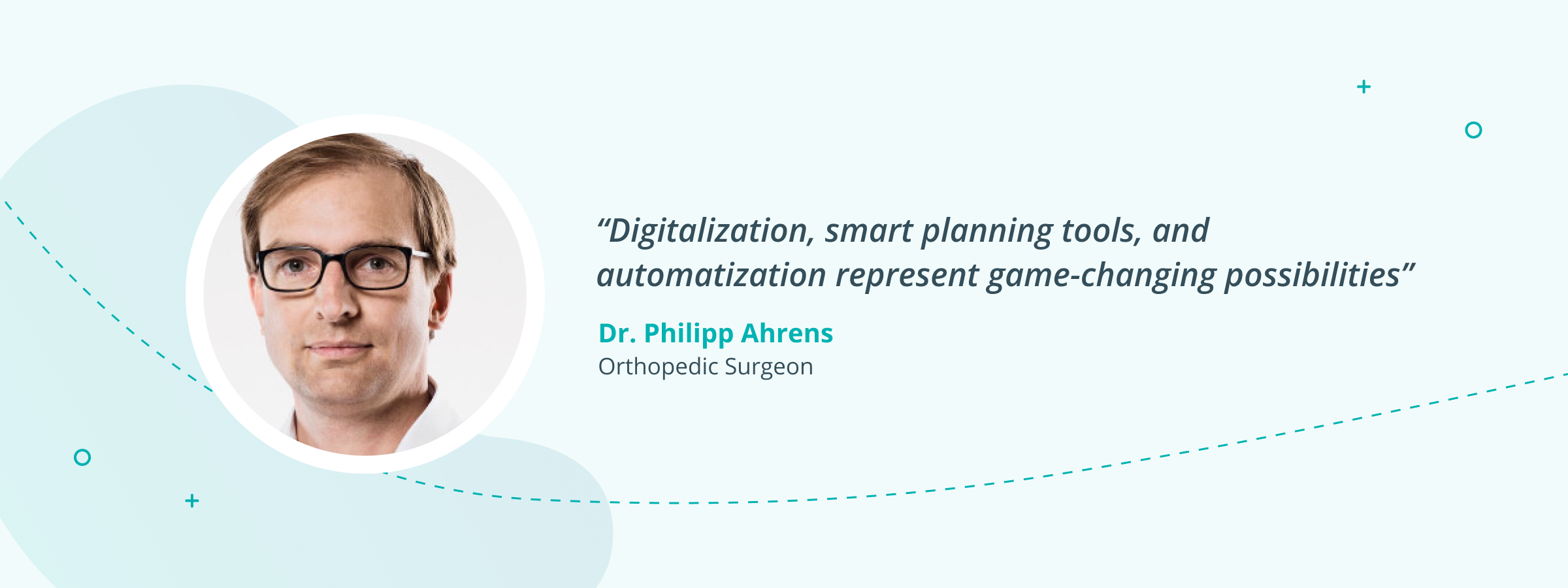
“The future of orthopedics is very exciting for very different reasons”, explains Dr. Philipp Ahrens, orthopedic and trauma surgeon with special expertise in sports medicine, knee joint preservation, cartilage repair, and leg axis correction.
“On the one hand, inpatient surgical indications are fast moving in the direction of outpatient or daily based short-term hospitalization, which is in line with international standards”.
This is a win across the board, as it allows patients to recover at home, which they prefer. They are gaining fast-track rehabilitation and early back-to-life activity.
“It would be desirable if the DRG system (Diagnostic Related Groups) realistically depicts complex combination interventions.” Which would have a real socio-economic impact.
As of today, in Germany, patients are classified into case groups for billing purposes based on medical diagnoses and treatments. So, even if a surgeon collects 2 or more main interventions into one surgery, only one procedure is countable. Other countries are using value-based concepts, in this situation, the surgeon concentrates all procedures in fewer interventions and rehabilitation times.
An approach like this will generate fewer hospitalizations, fewer rehabilitation periods, and shorter sick leaves. In the end, it will improve the efficiency of the medical system.
This is imminent since the market of surgeons is under high pressure due to demographic changes, questionable workloads, and a wave of retirements.
“Overall, digitalization, smart planning tools, and automatization as it is realized in the PeekMed planning solution makes the difference and represents game-changing possibilities”, Dr. Ahrens finishes.
Dr. Levi Fernandes: “More efficiency and less time consumed”
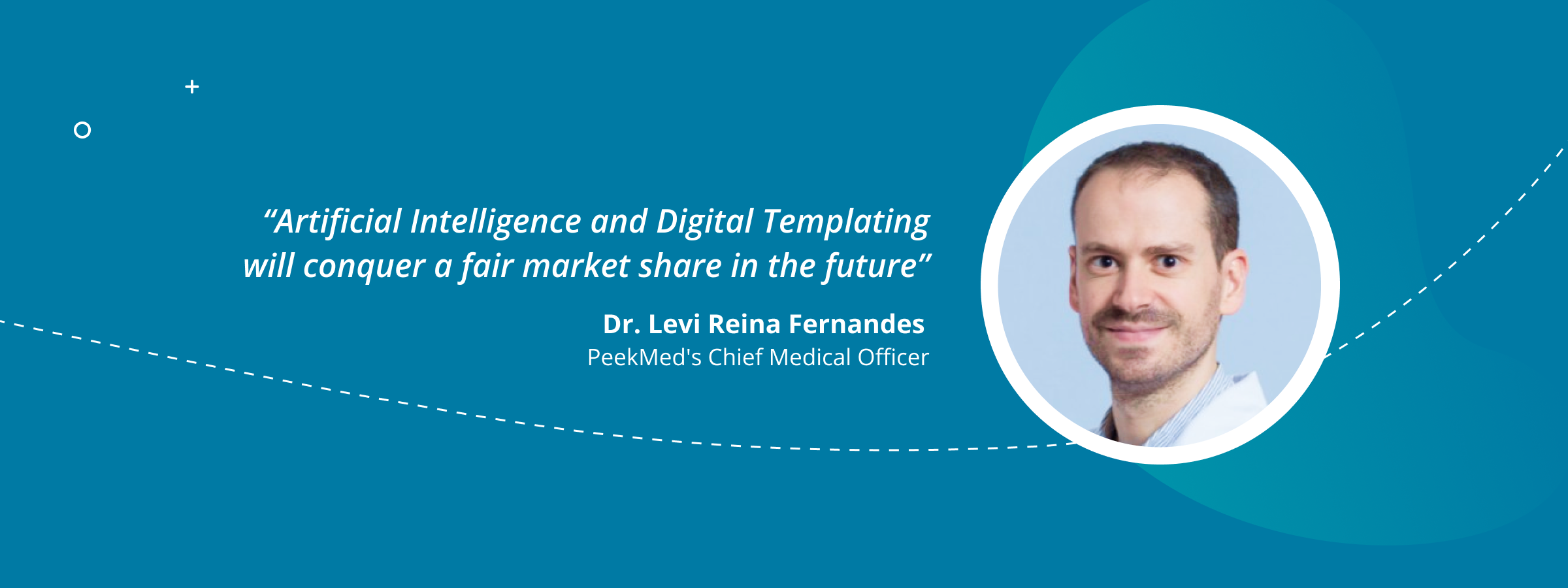
Questioned about new trends in the orthopedic surgery field, Dr. Levi Fernandes, explains that he believes value-based medicine is going to be a global orthopedic trend expected to grow.
“Especially in the knee surgery, I expect it to prosper. When it comes to knee surgery, that means we will see more efficiency and less time consumed both inside and outside the operating room and the hospital.”, explains the orthopedic surgeon with extensive experience in osteotomies.
“Osteotomies will slowly replace the palliative meniscectomies. Also, preoperative planning will be even more important.”
“TKA and THA will be reinforced – both as time-saving and as an important helper for orthopedic implants stock management, which has been under enormous pressure due to the pandemic situation.”, adds the, also, Chief Medical Officer at PeekMed.
As the pandemic shows some signs of weakening, Dr. Fernandes points out that he hopes the future of orthopedics goes through getting back to face-to-face meetings. “I think it will be good to get back to meetings to exchange ideas and experiences.”
“This is especially exciting as the American Academy of Orthopaedic Surgeons Annual Meeting is in just a month. ”, Dr. Fernandes points out.
“We should always be aiming to improve outcomes. I believe technologies such as Artificial Intelligence, Medical 3D Printing, and Digital Templating will conquer their fair market share in the future, too”, he adds.
Todd Davis: The Orthopedic Implant Industry is transforming
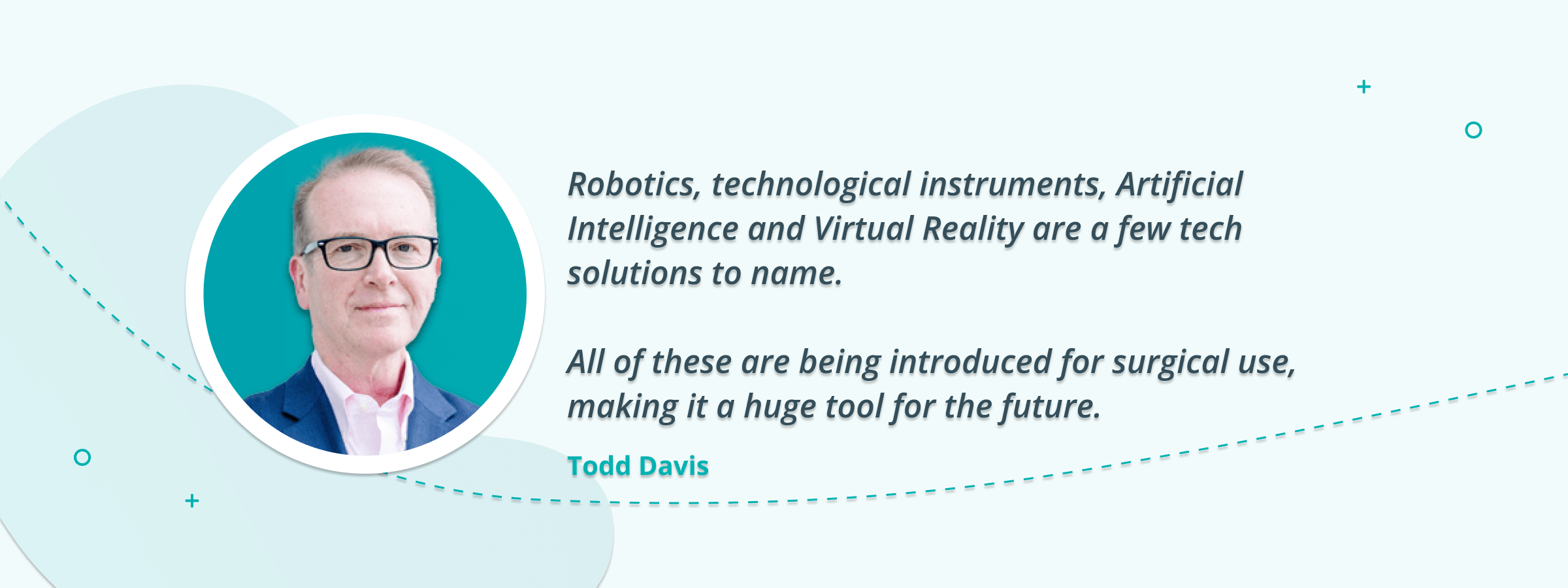
On the non-clinical side, prospects of change in the Orthopedic Equipment Manufacturers (OEM) are also very likely.
With over 3 decades of experience working in the industry, Todd Davis has a very broad knowledge of how the whole field intertwines.
Robotic Surgery, Artificial Intelligence, and Virtual Reality are some of the technological trends that Todd considers will impact the industry in the short term.
On another note, Todd highlights the role of Outpatient Surgery and Ambulatory Surgery Centers. Boosted by the pandemic of COVID-19, Todd believes it might be a swift paradigm in the orthopedic surgery industry.
You can learn more about Todd’s thoughts regarding where the orthopedic implant industry is going by reading the full interview.


